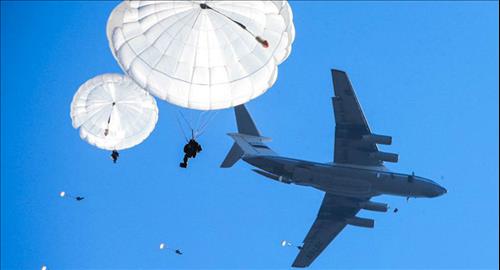
Turkey's 'artificial borders' a can of worms
Also on Monday in Moscow Russian Defence Minister Sergey Shoigu disclosed that the troops of the Southern Military District units of the airborne troops and military transport aviation have been put on full combat alert to test their readiness to respond to crisis situations.
The two developments seem unrelated. But they are not. Their thud will be heard in Ankara.
Of course Russia is not going to war with Turkey. But then Turkish President Recep Erdogan once again threatened last week about acting against Kurds across the border on Syrian territory no matter what it takes.
Omer Celik the spokesman of Justice and Development Party which rules Turkey also said ominously that the emergence of any independent Kurdistan on the region's map would 'further complicate' the Middle East which is already destabilized by the 'artificial borders of the Sykes-Picot Agreement' of 1916.
Why the Treaty of Moscow (March 1921)or the Treaty of Kars (October 1921) that followed it? The short point is that even today these two treaties define Turkey's borders with Armenia Azerbaijan and Georgia (which used to be former Soviet republics) and yet their legality remains highly debatable.
The Bolsheviks struggling desperately to survive the foreign invasion made territorial concessions to Turkey. The Treaty of Moscow (like the Treaty of Brest-Litovsk with Weimar Germany) marked Russia's exit from World War I. But curiously neither the Bolsheviks nor Ataturk at that time represented their statesUSSR or the Turkish Republicwhich were formed subsequently.
After World War II Soviet Union demanded the return of the territories ceded to Turkey. But Winston Churchill intervened to take Turkey under the Anglo-American wings and Joseph Stalin avoided a confrontation.
The Russian lawmakers who petitioned the Kremlin underscored that today Moscow speaks from a position of strength and should let it be known to Ankara that any 'escalation of the conflict' in Syria by the latter is fraught with the danger of the Turkish state's borders in the Trans-Caucasus unravelling. They wrote 'Only this can bring it (Turkey) down to earth and prevent it from carrying out new provocations'.
To be sure brinkmanship is galore as the Syrian government forces tighten the noose around Aleppo the biggest city in the country which has been for the past threeyears in the hands of the rebel groups supported by Turkey.
The government forces have reached within 13 kilometres of the Turkish border pushing through rebel-held towns in an offensive backed by massive Russian air support to impose the Syrian sovereignty.
The pundits in Moscow suspect that the Saudi offer to put boots on the ground in Syria at this juncture could be a ploy worked out in league with Turkey that provides a fig-leaf for the latter's military intervention in Syria with a view to salvage the rebel groups and to stem the tide of the war going entirely in favor of President Bashar Al-Assad.
Given the virtual closure of the Syrian air space to Turkish aircraft any such military intervention could be a high-risk enterprise but the maverick leaderships in Ankara and Riyadh are perfectly capable of making errors of judgment. Erdogan also has a need to whip up nationalist frenzy and xenophobia for domestic political purposes.
The Syrian foreign minister Walid al-Moallem probably echoed the Russian thinking when he said in the weekend “I think there is something being cooked under U.S. supervision between Turkey and Saudi Arabia. Whether Saudis or Turkish all those who will practice aggression on Syria will be sent back in wooden coffins. After the victories of the Syrian army and its allies the conspirators against Syria have become desperate with the failure of their tools on ground so they decided to enter personally.”
All in all therefore Moscow watches warily the signs of Erdogan's testiness lightly. It cannot be lost on Moscow that the US reaction to the Saudi readiness to deploy troops in Syria has been welcoming. Besides there is enough evidence that Turkey and Saudi Arabia are moving in tandem. Erdogan has visited Saudi Arabia not less than three times during the past one-year period. The two countries have set up a military coordination body and openly voice skepticism that the Syrian conflict will ever be resolved politically.
The heart of the matter is that the shadow play over the Geneva peace talks on Syria may have run its course. Russia will not stop its military operations in Syria until the country's borders with Turkey and Jordan are closed to terrorists. It refuses to walk into the trap of an open-ended conflict in Syria.
The skeleton of the Treaty of Moscow tumbling out of the cupboard today and the display of combat readiness of Russia's Southern Military District are a warning that the conflict in Syria could easily spiral into deeper mayhem. It comes just ahead of the two-day meeting of the NATO Defence Ministers starting Wednesday (Feb. 10) in Brussels.
(Copyright 2015 Asia Times Holdings Limited a duly registered Hong Kong company. All rights reserved. Please contact us about sales syndication and republishing.)

Legal Disclaimer:
MENAFN provides the
information “as is” without warranty of any kind. We do not accept
any responsibility or liability for the accuracy, content, images,
videos, licenses, completeness, legality, or reliability of the information
contained in this article. If you have any complaints or copyright
issues related to this article, kindly contact the provider above.

















Comments
No comment